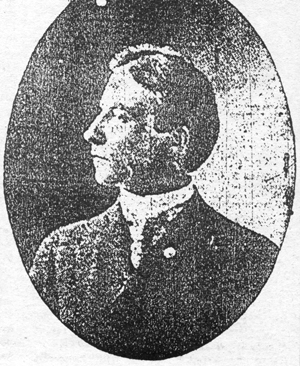James B. Osborne had served the Georgia Populist party well in the fierce election campaign of 1894 traveling the state, debating local Democratic candidates and speaking in support of gubernatorial candidate James K. Hines.
One year later he was at the same work, this time in behalf of the Populists of Mississippi. On Aug. 23, 1895, he debated Democrat S.A. Witherspoon at the courthouse in Meridian. On Sept. 2, a Mississippi correspondent for the Journal reported:
…the pops have imported one or two foreign orators, one of whom is a one-eyed and one-ideaed fellow named J.B. Osborne, and claiming to hail from Georgia, from which state he says he barely escaped with his life on account of his outspoken opposition to the democracy [ie. the Democratic Party]. Osborne is possessed of the gift of gab to an unlimited extent, self-assurance in unmeasured degree, and those qualities are about all he needs in addressing the audiences that assemble to hear him.

James B. Osborne, 1906
Osborne was back in Atlanta by December in time for the state Populist convention, where he led the Fulton County delegation and was elected a delegate to the party’s national convention. Jacob Coxey, the Ohio leader of the “army” of the unemployed who had marched on Washington in 1894, was in Atlanta and Osborne introduced a resolution inviting him to address the assembled Populists. Many delegates protested strongly, not wanting their movement tarnished by association with Coxey, a wealthy horse breeder who preached reincarnation and compared himself to Christ. The Populists snubbed Coxey, but Osborne arranged for his old commander to speak in the basement of the Fulton County courthouse that evening.
In 1896 Georgia Populist leader Tom Watson ran for vice president and the party chose many wealthy “respectable” men as congressional candidates. As the leadership moved to the right in search of Democratic votes the Populist rank and file grew dissatisfied. At the state convention on June 23, 1897, a delegate proposed the customary resolution endorsing Tom Watson.
To everyone’s surprise, J.B. Osborne rose to object, saying that it was not the party’s business to endorse individuals. The motion passed despite Osborne’s objection, but he took the floor again to propose a counter-resolution “that the Populist Party was not under the thumb of Mr. Watson, did not gather at his beck or disperse at his frown.” Osborne’s resolution was successful.
Within two months Osborne had apparently given up on the Populists and traveled to St. Louis for the national convention of the Social Democrats, the new socialist party recently founded by Eugene V. Debs. Osborne was appointed state organizer for Georgia and authorized to call a state convention on Sept. 27. From this time on, James B. Osborne became the leading Socialist in Georgia, lecturing and organizing throughout the state. Around 1898 Osborne, his wife and children moved from Atlanta, possibly to Columbus. Osborne had lost his right eye as a young man, and about this time lost the use of his left eye.
Osborne’s blindness did not keep him from traveling and speaking, and he seems to have toured extensively across the country in behalf of the Socialist Party. I have not followed Osborne’s life between 1898 and 1906, so our narrative must skip ahead to that eventful year.
Atlanta was convulsed in the spring of 1906 by the arrival of Dr. R.A. Torrey, a fiery evangelist who harangued crowds of hysterical sinners and curiosity-seekers for weeks while making a tidy sum from peddling his books in the lobby. The Rev. Dr. Torrey offered his solution for the problems of low wages and unemployment:
“Any man could obtain a job who would first give his heart to God, pray for a job, and then hustle for a job.” The fact that Torrey was born to great wealth made his pronouncement the more galling. James Osborne, Socialist and Congregationalist minister, announced that he would return to Atlanta to offer a public rebuttal to the evangelist.
Continued Next Week
© 1994 John Ryan Seawright
Like what you just read? Support Flagpole by making a donation today. Every dollar you give helps fund our ongoing mission to provide Athens with quality, independent journalism.







